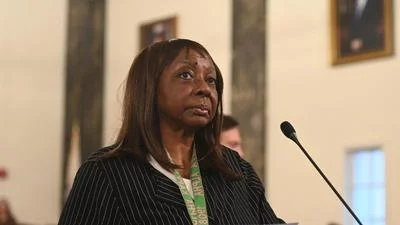Cupcakes for Courage owner Laura Pekarik | Contributed photo
Cupcakes for Courage owner Laura Pekarik | Contributed photo
A Cook County Circuit Court judge's recent decision to support Chicago's 200-foot rule restricting where food trucks can go is limiting choice in the city, a marketing manager for a think tank said during a recent radio talk show.
"It's incredibly disappointing," Illinois Policy Institute Marketing Manager Eric Kohn said during a recent edition of "Illinois Rising," speaking to the show's host, Dan Proft. "People benefit from more options and the kind of sit-down restaurants that you referenced. These are different dining experiences. If you're really looking for fine dining, you're not going to think, 'Oh, I'm going to stop at a food truck.' For those who want the food trucks, that choice should be there. It's more options for people."

A food-truck festival
| Contributed photo
That portion of the show focused on a recent ruling in a case first filed by the Institute for Justice in 2012 in Cook County Circuit Court on behalf of Cupcakes for Courage Owner Laura Pekarik. Cupcakes for Courage was founded after Pekarik's sister, who loves to bake, was diagnosed with non-Hodgkin’s lymphoma in May of 2010, according to the food truck's website.
During her sister's treatment, as a way to keep their spirits lifted, the two talked cupcakes.
"We were experimenting with cupcake flavors and baking," Pekarik recalled on the same edition of the radio show. "It became a passion of mine."
From that, Cupcakes for Courage was born.
"I wanted to travel around and go where I thought my customers were," Pekarik said.
Her sister's cancer is now in remission, and she’s doing very well, Pekarik said.
However, the city of Chicago took a dim view of the venture. Cupcakes for Courage ran afoul of a food truck ordinance passed by the Chicago City Council in July of 2012, requiring that all food trucks have a GPS system for the city to monitor their location and that the trucks must stay more than 200 feet away from stationary retail food establishments.
The food trucks in downtown Chicago soon found themselves in so-called "islands" where they could still do business without triggering the city's 200-foot rule, but soon found they were crowding each other.
"Due to parking circumstances, it became harder and harder to do business," Pekarik said. "My driver would go out there, and she'd be looking for parking. We'd post stops that we knew were OK and then she couldn't get parking there."
Shortly afterward, the Institute for Justice filed its lawsuit on behalf of Pekarik, maintaining the ordinance's requirements were unconstitutional, alleging the 200-foot rule violates the due-process clause of the U.S. Constitution because Cupcakes for Courage has the right to pursue its livelihood free from arbitrary and irrational regulations. The lawsuit also alleged the GPS requirement amounted to unlawful search and seizure.
On Dec. 5, Cook County Circuit Court Chancery Division Judge Anna Demacopoulos ruled in favor of the city of Chicago, saying the city can regulate food trucks differently than it does restaurants. Demacopoulos said the city has the right to balance interests of restaurants, food trucks and sidewalk congestion.
The judge ruled that food trucks are not the same type of business as restaurants and that the city's implementation of the 200-foot rule works toward the goal of reducing sidewalk congestion in Chicago. Demacopoulos also found that the GPS requirement did not amount to unlawful search and seizure.
Cupcakes for Courage and the Institute for Justice have said they will appeal.






 Alerts Sign-up
Alerts Sign-up